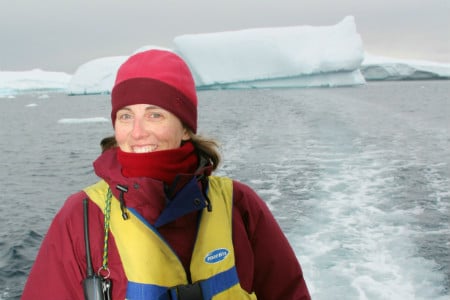 With years of leading groups and travelling up her sleeve, this friendly and patient assistant expedition leader is always happy to help make your voyage the best it can possibly be! Having grown up in three different countries (the Philippines, USA and Australia), Liz caught the travel bug at an early age. Since then she has travelled widely throughout Australia, New Zealand, India, Vietnam, Nepal, Africa, Europe, and Mexico.
With years of leading groups and travelling up her sleeve, this friendly and patient assistant expedition leader is always happy to help make your voyage the best it can possibly be! Having grown up in three different countries (the Philippines, USA and Australia), Liz caught the travel bug at an early age. Since then she has travelled widely throughout Australia, New Zealand, India, Vietnam, Nepal, Africa, Europe, and Mexico.
After finishing postgraduate study in biology, Liz found herself leading overland safaris throughout Eastern and Southern Africa, experiencing the wild side of camping with elephant, rhino, lion, and the occasional feisty wart hog! Taking a break from truck life, Liz faced the daily challenges of ‘hippo dodging’ while managing a lodge in the Okavango Delta.
On returning to Australia, Liz satisfied her passion for conservation and animals working at Sydney’s Taronga Zoo as an education officer for their ‘Roar & Snore’ program.
Liz has been working with AE Expeditions in Antarctica for several seasons as well as completing seasons in the Arctic in between, and she joins us to talk about working in some of the most remote regions in the world…
What is your area of expertise on board & tell us what your role involves?
I work as the Assistant Expedition Leader. As well as general guiding and interpretation in the field, lecturing, and driving Zodiacs, I work very closely with the Expedition Leader to plan and execute our day-to-day operations ultimately to ensure the safety of our passengers whilst they have the best possible experience on their Antarctic expedition.
How did you start working on expedition ships in Antarctica?
Like many of us that are working down there, I feel like I was in the right place and the right time when I was offered this opportunity. Antarctica has the capacity to easily get “under your skin” and that’s exactly what happened to me. To not be down here amongst the penguins and ice each summer would feel wrong… although I never, ever take this job for granted.
Describe an average day’s work in Antarctica aboard an expedition ship?
There is no real typical day’s work in Antarctica! Every day is different, every expedition is different, every season is different… regardless of how many times you have visited a particular site! We take into account all the variables (including wind, swell, ice, distances between sites, availability of sites and location of other ships, previous expedition activities and wildlife sightings) to plan a day, but often we will have to very quickly come up with alternate plans when the weather and ice conditions change.
What do you consider the best part of working in Antarctica?
I love being able to share this incredible wilderness with other people – many of whom have saved and dreamed for years before visiting. And of course, there continue to be many, many moments that can only be described as an overwhelming emotion… feeling completely insignificant and humble compared to the might of Mother Nature down here.
Who has been the biggest influence of your success?
I have been lucky to come from a family of strong, independent women who have had a natural curiosity about the world and who just got on with life and their interests – without any particular focus on, or reference to, their gender. In addition, my parents have always been supportive of whatever path I have chosen.
What does International Women’s Day mean to you? Is it important that we have one?
I see International Women’s Day as an opportunity to not only celebrate the contribution that women have had, and have to the world at large; but to highlight the fact that in many societies, cultures and countries around the world, women continue to struggle to get equal opportunities to basic things such as education, healthcare, and legal rights.

